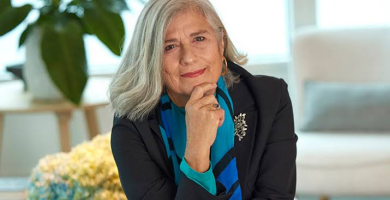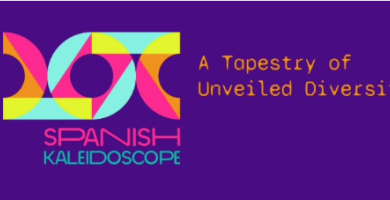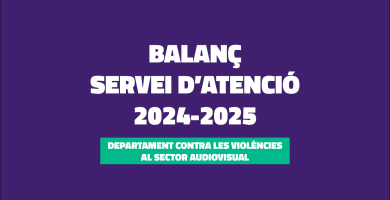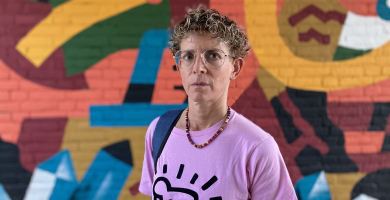
MARTA ARMENGOU: "It’s a question of summarizing what’s happened, but above all also focusing on what will come, obviously, in order to attract a bigger audience.".
This month we interview Marta Armengou, who graduated in Audiovisual Communication at Ramon Llull University, a film critic, programmer and writer, always related to film. For 13 years she ran the La Cartellera film programme on the betevé TV channel. She is now the director and presenter of the Filmoteca de Catalunya’s new podcast Viatge a Júpiter (A Trip to Jupiter). We talk about this in the interview.

How did the idea of creating the Filmoteca de Catalunya’s podcast come about?
It was the Filmoteca’s idea. They already had this idea because they saw that there were more and more organizations and institutions setting up podcasts, because it seemed to be a medium that was connecting very well with people and was a way of extending everything that was done through this channel. They contacted me last year and asked if I would like to do it.
What frequency does it have?
Monthly. The first one came out in January. It’s quite a special episode compared with the rest, because it sort of summarizes the whole of the Filmoteca’s programme for the year. We focus on the big names or the big cycles of 2023. We did it with Esteve Riambau, who discussed the programme. The rest will have a different format.
What the podcast wants to do is to take another look at things that have happened, to chronicle what’s taken place that month and record whether there have been any important visits. For example, the visit by Pedro Costa who was presenting films for several days, but who also gave a guided tour of Oliveira’s exhibition. It’s a question of summarizing what’s happened, but above all also focusing on what will come, obviously, in order to attract a bigger audience.
Apart from programming, in the podcast will we discover other aspects of the Filmoteca that maybe people don’t know so well?
Yes. We want to show a little about what the Filmoteca is in itself, the people and the different activities that are organized. The idea is to be able to talk with different people, from a projectionist to people who look after the archive,... different positions which are sometimes not well enough known, but which play a very important role within the Filmoteca and which we think it’s very important to publicize because they have very interesting things to say which many people maybe do not know.
Do you think that the podcast format is better for reaching new film audiences, such as the younger audience?
Probably. Podcasts are working very well, but with many different audiences as well. Not just young people, but also very old people. The advantage of the podcast is that you can listen to it whenever you want and however you want. And that, if you can’t listen to it all in one go, you can do so little by little, on the way to work or while making your dinner. This flexibility is an advantage.
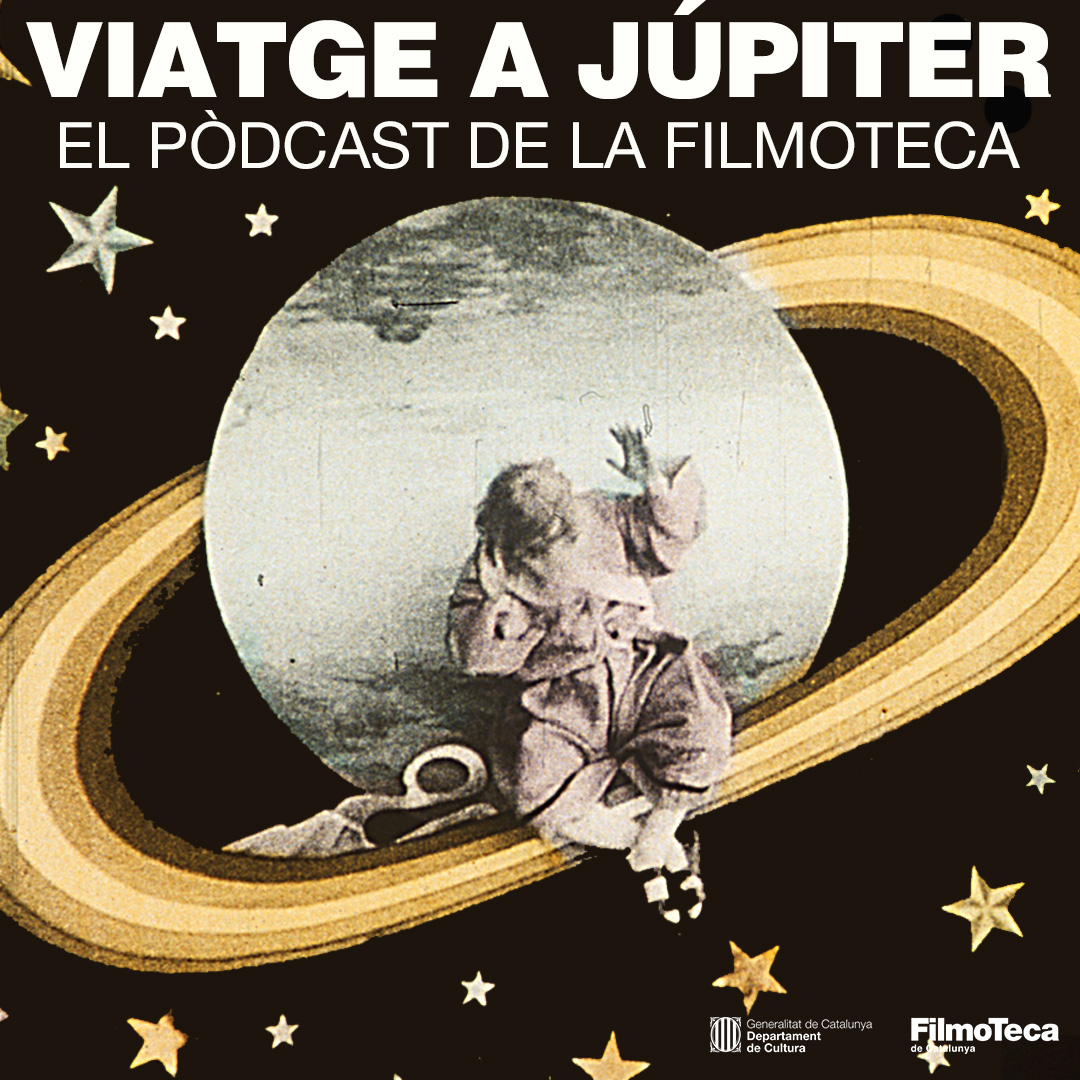
Out of curiosity, why is it called A Trip to Jupiter?
We wanted it to have a name closely linked to the Filmoteca. A Trip to Jupiter is the title of one of the films by Segundo de Chomón, and moreover the 150th anniversary of his birth was celebrated in 2021 in the Filmoteca. We wanted a figure who was closely linked to the world of film in Barcelona. We found this name, which evokes these journeys, to be powerful and it was also the image of the tribute to Chomón. He’s a well-loved figure, linked to Barcelona.
What would you highlight about this year’s programme? What shouldn’t we miss?
It’s difficult to say. When we have a content meeting about what we include and what we don’t, the work involves making a selection, because there’s an extremely broad programme. At the moment, one of the best things it has is this balance between more classical films or those with better known names and the commitment to filmmakers who are maybe more unknown by the general public. We should also emphasize these figures who perhaps go unnoticed but who have as much or even more interest than others.
It’s obvious that Godard’s death last year is very important and the cycle on Godard, which moreover has several stages, will be one of the most powerful. One of those that I like the most, which we’re carefully preparing, is the one on female screenwriters of Hollywood from the 1920s in silent film. This will moreover allow us to do something else that we want to do in the podcast. We saw that as the programme is so broad, and there are so many visits, sometimes it’s worth being able to offer a more in-depth interview in some of the cycles or with some of the guests. Apart from the monthly podcast which will have more eclectic content, there will be a second podcast which will focus on a cycle or a filmmaker or a profession, but it will be a much longer in-depth interview in order to be able to talk more calmly about all this. We think that the people who listen to the other podcast may also be interested in the interview. We’ll have an expert teacher on this subject, Giuliana Muscio, who’s helped to prepare the programme of this cycle on female screenwriters of Hollywood in the 1920s, and we want her to tell us more things and we think it’s worth more time than just a short interview.
And where can we listen to it?
You’ll find more information and the link to the podcast on the Filmoteca website. It takes you to the two channels where you can listen to it, which are Spotify and Ivoox.
I’d like to talk a little about your career. When did you begin to become interested in film?
From when I was very young it was clear that film was very important for me and that as far as possible I wanted my life to be linked to film in one way or another. Life takes you down several paths. My career has been linked to the world of film above all through news and reviews.
You’ve been working in the cultural sphere in general and film in particular for more than 20 years. When did you decide that you wanted to devote your professional career to this?
Like many people, initially you want to make films and not talk about films, and in my case at the beginning I did focus my career more toward this aspect. Afterwards, I gradually saw that what I thought about filming was idealized or wasn’t the environment in which I felt the most at ease. What I liked above all was writing. At the time I thought that maybe my future was more in scripts, above all for television. It was a little through first writing scripts for television programmes that afterwards, little by little, I focused on issues of culture and more specifically of film.
You currently contribute to various media outlets, such as La Ventana Indiscreta and Catalunya Ràdio’s podcast Ja m’entens. Is the LGTBIQ+ community well represented in film or is there still much to be done?
There’s still a lot of work to do. Really, there’s still very scarce representation. What we’re achieving is that increasingly the representations that do exist aren’t victimized as much. There are more options to see films or series which also portray it positively and not always from the point of view of the difficulties of the community. And, indeed, it’s clear that there’s still a lot to do because there are many series and films which tackle this issue but which don’t work well with the audience. What makes one romantic comedy between a heterosexual couple work and not another? I don’t know, but we still need to see many more stories so that in the end it doesn’t make any difference whether you see one option or the other or that it’s not specifically aimed at the audience from the same community.
Do you think that series like Smiley, for example, help to change this situation?
Probably. Romantic comedy, like this case, is much more accessible. And it means that it reaches a much wider audience. That’s one of the ways. It’s good that there’s a little of everything, but it would also be good for there to be another kind of film, because these comedies tend toward stereotypes or clichés. It’s good that they reach a lot of people, but I don’t know to what extent they perpetuate certain roles that we’ve already seen many times. And I think we need more risk, not just in LGTBI films but in general. It’s more and more difficult. When you see films from decades ago and you see certain proposals, they would be almost unthinkable today. There’s much less risk in film today.
Are more risks taken in independent film, which has more difficulty to reach an audience?
Yes, but it happens even with independent films. For example, I think that in the 90s it was much more ground-breaking with many subjects, not just formal ones. And now I find it more difficult to see, even in independent proposals. Sometimes you see a very conventional discourse and it’s a shame. I’m not sure why that is, whether it’s just a question of fear, that people above all want to please the general public. There’s always this desire to reach as many people as possible. We need more wild filmmakers. We need more Godards, more Vardas.
Do you think we’ve made more progress representing women than representing LGTBI? It’s true that the Filmoteca devotes many cycles to female filmmakers, which didn’t happen 10 years ago.
The Filmoteca is investing a lot in this respect and is doing very good work. Even I’ve discovered filmmakers that it was very difficult to access. I remember the cycle on Dorothy Arzner or last year with Márta Mészaros or Kira Muratova. It’s really doing work of immense value, since it’s very difficult to gain access to these filmmakers. Unfortunately, they’re not usually present on any platform. Two days ago, Filmin announced that it would have the film by Chantal Akerman, Jeanne Dielman, 23, quai du Commerce, 1080 Bruxelles. What surprised me the most is that, after the poll in Sight & Sound in which it was in first position as the greatest film in history, here in Spain you couldn’t see it anywhere. Finally, Filmin has rolled up its sleeves, but there are tons and tons of films like these which can’t be seen anywhere. In this respect, the Filmoteca is playing a crucial role, which is very important and moreover with copies which are really impressive. And I think that much more should be done, because it’s still difficult for us to find many female benchmarks. Sometimes, when I talk to filmmakers, they hardly have any female benchmarks or they always talk about the same ones, Chantal Akerman or Agnès Varda, but apart from that there isn’t a great deal of knowledge about female filmmakers and they’ve been making films since they were invented. It’s still difficult to believe. In this respect, there’s still a great deal of work to do.
In actual fact, many women created films. There were very many who were there at the beginning of film but then they were written out of history.
Exactly. Little by little, work is being undertaken to vindicate them and place higher value on them. And I think that’s a very important task, which is being carried out all over the world. It’s more difficult to find things, because when you’ve literally erased them, it’s difficult to find information or documentation, but I think that more will be done and that’s what has to be done. Higher value has to be placed on this. Lately, we’ve seen documentaries on them, film archives from different countries which are recovering films and restoring them. They have to be publicized because they are also part of history. People only seem to know the history of films made by men and there are lots and lots of women. It’s good and essential to have benchmarks, especially now that there are more and more women making films. Films about maternity hospitals or abortions, which are very topical now, were subjects that were already talked about from the beginning of film, or marriage was questioned. All these things already existed and it’s important that they are seen. I’m now working on a project which is going in that direction a little, trying to place higher value on the work of female filmmakers worldwide and from all periods. The problem is that it’s very difficult to carry out a project from scratch.
You combine your work as a journalist with other tasks such as festival programmer, lecturer, presenter and moderator in cinematographic events. Does a female journalist devoted to films have to do a lot of things to survive?
My life changed when La Cartellera closed on betevé. I was linked to the programme for 13 years and, of course, it took up a great deal of time. Because, moreover, although we complained thousands of times, we were working with a very small team which was barely enough to make a film programme. This meant that we needed to put in a lot of hours of work and it’s true that then it was more complicated to combine things. What I’ve seen after all that is that most people are freelance and have to do a thousand different things here and there to get by. They’re often badly paid collaborations and you have to do many things to get to the end of the month. And I’ve found that I’ve been offered things, even from important public media outlets, which were unpaid. Still, at this stage and with the experience that you have, there are media outlets which dare to propose things to you without paying absolutely anything. It’s very worrying and, moreover, I suppose that, if you say no, because of your principles, you know that someone else will end up doing it. And in many cases you end up knowing who, because you know who proposed it to you and it’s a very small world. It’s surprising that this still happens and that some people give in. We can’t continue perpetuating this model. There must be limits. I think that’s important, because otherwise the wheel will just keep turning.





